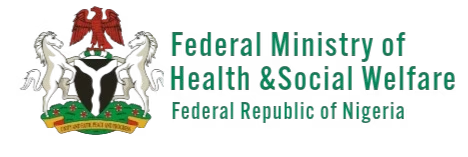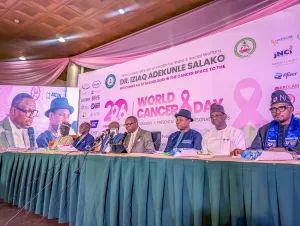Topic: Strengthening Nigeria’s Health System Resilience for Sustainable and Inclusive Care.
Venue: Transcorp Event Center, Maitama, Abuja. Date: Thursday, November 13th, 2025
PROTOCOLS
- It’s another moment to reflect deeply as I address this august gathering to share my thoughts on inaugural topic for this year Joint Annual Review Meeting (JAR) titled “Strengthening Nigeria’s Health System Resilience for Sustainable and Inclusive Care”
- The last half a decade have no doubt tested health systems globally in unprecedented ways. First it was the COVID-19 Pandemic in 2020 and then from about a year ago, there has been a significant reduction in development assistance for health by major donors especially the US, UK and Germany. Both incidences have exposed health system vulnerabilities but also challenge us on the power of coordinated action, innovation, and political commitment to overcome global health challenges. Today, as we gather to review our progress and chart our path forward, we do so with both the humility of lessons learned and the determination to build a health system that truly serves all Nigerians.
- Let me begin with an honest assessment of our current position. According to the 2023 Nigeria Demographic and Health Survey (NDHS) preliminary results; Maternal Mortality Ratio stands at 512 deaths per 100,000 live births (down from 576 in 2018), Under-5 Mortality Rate stands at 110 deaths per 1,000 live births (a reduction from 132 in 2018), Neonatal Mortality is at 41 deaths per 1,000 live births, Skilled Birth Attendance is up from 43% in 2023 to 53% (up from 43% in 2018), Full Immunization Coverage at 39% is an improvement from 31% in 2018 and Modern Contraceptive Prevalence is at 20% among currently married women.
- Government health expenditure is 5.2% of GDP (2025), far below the 15% Abuja Declaration minimum, Per Capita Health Expenditure is approximately $43 USD from all sources (2024). Though the National Health Insurance Coverage has grown to approximately 10-12% of the population, out of pocket expenditure for health remains as high as 71% and external financing dependency stood at 21% of total health expenditure. These figures underscore the twin challenges of insufficient investment and catastrophic health expenditure that push millions of Nigerians into poverty annually.
- Our over 30,000 PHCs are still not optimally functional as of the 2023 assessment. Our Doctor-to-Population Ratio is 1:5,000 (against the WHO recommendation of 1:600), while Nurse-to-Population Ratio is as low as 1:2,000 (against the WHO recommendation of 1:300). This is further compounded by the inequities in the distribution of health workers, where 75% are concentrated in urban areas, serving 45% of the population.
- While these figures above, shows some improvement over the last few years, they remain not complimentary enough for a nation of our stature, resources and ambition. Nigeria still accounts for approximately 14% of global maternal deaths and 9% of global under-5 deaths, despite representing only 2.6% of the world’s population.
- The government of President Bola Ahmed Tinubu fully aware of these challenges is making concerted efforts in partnership with state and local governments, development partners, and civil society to accelerate progress and deliver a health system that will optimally serve all Nigerians. We are fully conscious of the issues at stake and in the last 30 months of this administration, we have implemented a coordinated set of programs and interventions towards attaining a resilient health system for Nigeria in line with the Renewed Hope Agenda.
- The Nigerian Health Sector Renewal Investment Initiatives (NSHRII) being driven on the strategic imperative of a Sector Wide Approach (SWAp) to ensure efficient, collaborative, synergistic and non-siloed implementation is designed to deliver a health system that is prepared for, respond to and recover from shocks – a resilient Nigerian health system. I wish to share with you some of the ongoing coordinated interventions under the NSHRII:
- The Basic Health Care Provision Fund (BHCPF), since its operationalization in 2019, has transformed primary healthcare delivery. We have built on this, and the BHCPF represents our most significant domestic investment in Primary Health Care, and I commend the BHCPF Gateways (NPHCDA, NHIA, NCDC) and the MOC secretariat for the better coordination and the improved absorption capacity, rising from 45% in 2019 to 78% in 2023.
- The National Health Insurance Authority (NHIA) Act 2024 marked a paradigm shift toward Universal Health Coverage. We have witnessed increased enrollment into the insurance pool of care, and the state insurance schemes have contributed in no small way to improving the number of persons benefiting from pooled insurance care and access at both the National and subnational levels. Through the formal sector enrollment, the vulnerable group program, and the BHCPF integration pathways, over 20 million persons have been enrolled into care through insurance mechanisms.
- The convergence of BHCPF and NHIA represents a powerful mechanism for achieving UHC, but we need accelerated state-level implementation and enforcement of mandatory health insurance provisions for all Nigerians. Thanks to President Tinubu’s recent executive order on mandatory implementation across MDAs including for entities involved in public procurement and the defined benefit scheme for retirees, we forsee a significant accelation and exceeding our 2027 targert of 20% coverage.
- We have also focused largely on strengthening primary health care systems through several mechanisms and programs. The National Primary Health Care Development Agency (NHPCDA) and its state counterparts are expanding geographical captive areas for health facilities and access to basic health care. Working with the World Bank and other partners, significant strides are being made; State-level PHC boards have been strengthened in 31 states, and the PHC governance structures in more than 400 LGAs have been fully established and functional. PHCs are been upgraded with physical renovation, basic equipment supplies, and additional deployments which have seen the quality score of our PHCs improve from 42% to 67% baseline to endline assessment.
- With respect to disease-specific programs, we have recorded significant milestones and improvements. The HIV/AIDS Control has enrolled 1.78 million PLHIVs on treatment with a National ART coverage of approximately 80%, 72% viral suppression, and PMTCT coverage of 96% of HIV-positive pregnant women.
- The Tuberculosis Control Program at the Federal and State levels has recorded approximately 80% notification of estimated incidence, and greater than 85% treatment success rate. The infrastructure support for the TB program is at all levels of care, and we currently have at least 126 GeneXpert sites.
- The Malaria Control Program under the National Malaria Eradication Program (NMEP) has recorded significant milestones in Insecticide-Treated Nets Distribution (63 million between 2021-2023), increased to approximately 70-% of households with at least one ITN, Malaria Cases Averted estimated to be about 18 million annually, and 51% of Pregnant Women Receiving Intermittent Prophylaxis Therapy for prevention( IPTp).
- The Immunization program has also recorded achievements. We have achieved 57% Penta-3 Coverage as of 2023, up from 33% in 2017. We have recorded zero wild poliovirus cases since 2020. The milestone achievements in HPV immunization and the recently introduced combined measles – rubella (MR) vaccines is a testament to the increasing capacity of our health system to deliver targerted public health interventions.
- Reproductive, Maternal, Newborn, and Child Health (RMNCH) programs continue to be the bedrock of ensuring survival for the unborn and future generation. The health system has recorded improved sexual and reproductive health services for adolescents and young persons, ANC coverage and visits recorded a 42% increment, more than 50% of deliveries managed by Skilled birth attendants, a reduction in Maternal, Neonatal, and Childhood mortality, and an estimated 215,000 maternal and child deaths averted.
- We have initiated and continue to implement strategic human resources solutions for health. Between 2023 and now, over 37,000 health workers have been employed with over 75% in the clinical cadre. Though, migration continues to adversely affect retention, a health workforce migration policy has been developed to achieve better retention and a more collaborative contribution of Nigerian health professionals in diaspora. The Health Workforce Registry, expanded quota to produce more health care workers, the on the job training of over 70,000 health workers, the deployment of Community Health Extension Workers, the Health Fellows Program, National Rapid Response Team for disease surveillance, and expanded laboratory network staffing for the 130 laboratories are all geared to optimize manpower resources, support health security agenda and epidemic outbreak management.
- As part of improving the resilience of the health system, several health infrastructure developments are going on concurrently with over 500 high impact infrastuctural projects delivered so far and many more ongoinb. A key innovation implemented in this respect is the Power for Health Initiative, designed to ensure that our facilities have reliable electricity to power excellent and sustainable health service delivery. We have convened a National dialogue to advance this course, we have a clear implementation plan, and we are confident that the necessary investment to actualize this agenda from both the government and the private sector will be mobilized.
- We have inaugurated the Nigeria Digital in Health Initiative (NDHI) Implementation Committee, which laid the groundwork for coordinated action across all stakeholders. Building on that momentum, we secured the endorsement of the National Council on Health (NCH) for the nationwide implementation of the NDHI. This high-level mandate led to the development of National Digital Health Architecture (NDHA), a unified blueprint that ends the era of fragmentation and establishes clear, sustainable “rules of the road” for all partners within Nigeria’s digital health ecosystem. We are also building the foundational “digital highways” like the Health Information/Claims Exchange with Shared Health Record, National Health Registries – the Health Client Registry, Health Facility Registry, and Healthcare Worker Registry, which will provide a single source of truth for identity, service delivery points, and workforce information across the health sector.
- We have also invested in generating evidence for action through a research and innovation support system. One of our proudest accomplishments this year has been our renewed focus on research and innovation as the backbone of policy and system strengthening. Through the National Health Research Ethics Committee (NHREC) and the National Health Research Committee (NHRC), we have advanced the digital transformation of research governance and ethics review processes. The launch of Nigeria’s first Electronic Research Ethics Platform, supported by the U.S. CDC and partners, marks a pivotal shift toward transparency, efficiency, and national data sovereignty in research oversight.
- The lessons learnt from the COVID-19 pandemic have served as the catalyst needed to scale up the preparedness level of our country to confront new and emerging pandemics. The laboratory capacity for PCR testing has expanded from 5 to 129 laboratories and 7 geneomic sequencing laboratories. There is a robust disease surveillance and reporting system in place, we have fully established emergency Operations Centres in 32 states, and the SORMAS platform is deployed in all 36 states, with 96% of LGAs now connected and able to report in real time.
- Despite these commendable progress made so far, significant challenges impede our march toward health system resilience. The challenges are multifaceted, ranging from funding gaps, existing fragmentation and coordination challenges that are yet to collapse, the persistent and threatening human resources crisis of brain drain, top-heavy workforce, frequent industrial actions, inequalities in urban-rural distribution of health workforce, sub-optimal quality of care standardization, supply chain vulnerabilities, infrastructural deficit, high out of pocket expense for health and so on . However, we have refused to be defined by our challenges; rather, we have taken a determined stance change the narrative, now, once and for all.
- Based on evidence from our interventions and persistent gaps, we are committed to continue to challenge the status quo by thinking innovatively and sometimes disruptively, implementing ongoing efforts with greater determination and fidelity, advocating for additional support and collaborative partnership, and continuous monitoring and holding ourselves accountable for results like we are doing at this JAR meeting.
- In specific terms, we will continue to push for Health Financing Reforms and make a strong case for increased budgetary allocations, , we will continue to ensure guaranteed BHCPF release, improved capital expenditure release and work to honour obligations attached to our Health Infrastructure Bond. We will continue to encourage the states to meet their health budget benchmarks and ensure that counterpart fundings are released to match donor fund obligations.
- We are determined to expand insurance coverage by enforcing the mandatory subcription with the support of other agencies of government. We are working to scale up the Vulnerable Group inclusion, and expand the benefit package to include catastrophic health conditions, NCDs, Mental health, and emergency care services.
- We will continue the scale up the capacitation of our PHCs to provide basic and essential services; as we ensure compliance with minimum standards of care, we will ensure additional training and deployment of the different cadres of health workers needed to ensure service delivery fidelity and consistency.
- Our digital health transformation agenda will continue to receive frontline attention as we ensure the needed investment is provided. The National Health Data repository remains a priority, just as we take steps to expand the telemedicine infrastructure to reach more Nigerians, irrespective of where they live or work.
- Without commodity security, there cannot be health security. As such, we will take steps to guarantee supply chain security through multiple innovative approaches, including the Supply Chain Digitalization process, and transparent commodity forecasts, procurement, distribution, and accountability systems.
- Our HRH remains a strategic asset that we will continue to invest in to sustain, expand, and secure. The distribution inequalities will be frontally addressed through initiatives like the rural retention incentives. To further strengthen the capacity for specialist care, we will concretize our Diaspora engagement plans to further convert the previously tagged brain drain to brain gain and “JAPA” to “JAPADA”.
- As part of our long-term sustainability plans, we will prioritise building a climate-resilient health system anchored on green energy deployments, including solar, gas, and hydrogen-powered energy systems. We also hope to use the carbon credits obtainable from these initiatives to further finance the resilient health system enablers in our facilities.
- Finally, we will continue to demonstrate responsible leadership for the health system governance and accountability processes. The multi-stakeholder health sector coordination Platforms, like JAR and the NCH, will continue to be supported. Accountability will be both at the Federal and state levels, and we will continue to ensure transparent and judicious use of allocated health resources.
- Your Excellencies, Distinguished Ladies and Gentlemen, The theme of this Joint Annual Review, ALL HANDS, ONE MISSION, and the topic of this address, Strengthening Nigeria’s Health System Resilience for Sustainable and Inclusive Care, is far beyond rhetoric; it is a clear reflection of our determination, an opportunity to recommitt ourselves to the ideals of collaboration and collective responsibility for a resilient health system.
- We have made commendable progress. The BHCPF is providing millions with their first access to quality care, immunization coverage has improved significantly, our health system is functioning despite the global pandemic of funding gaps. States are innovating with health insurance schemes, and development partners are investing billions in our health security.
- But we must be honest that our progress is not happening at the pace to meet the health needs of 230+ million Nigerians. Too many mothers still die in childbirth, too many children don’t reach their fifth birthday, and too many families are impoverished by healthcare costs and too many skilled health workers are leaving our shores. Health system resilience is not built overnight. It requires sustained investment, political will, technical excellence, community ownership, and accountability which all of us must commit to play our part.
- Our resolve is to build on what is working while addressing critical gaps. Accelerating forward requires strong political commitment to prioritize health in our national budget, financial discipline to release allocated funds promptly and fully, technical excellence in designing and implementing programs, collaboration across sectors, levels of government, and wirh partners, innovation to leapfrog traditional development pathways, and accountability to our people who deserve quality, accessible, affordable healthcare
- The resilient health system we seek is one where every Nigerian, regardless of location or income, can access quality healthcare without financial hardship, health workers are motivated, adequately remunerated, and equipped to deliver care, health facilities have power, water, medicines, and equipment, data drives decisions at all level, communities are active participants in their health, and Nigeria takes a leadership position in health innovation and self-reliance.
- As we conclude this Joint Annual Review today, I call upon every stakeholder represented here to renew their commitment to health system strengthening. Let this era be remembered as the period when Nigeria made the decisive turn toward universal health coverage and health system resilience. Only healthy people can translate to a healthy nation and only a healthy people can produce a prosperous, secured, and great country. Let us join hands to deliver health to our people and make Nigeria great again.
- And so, with peace and plenty, Nigeria shall be blessed.
Thank you for your kind attention.





